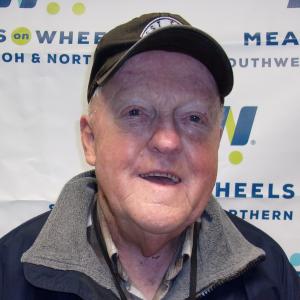 Bob Reid looks at his watch. It’s a little after noon on the first Tuesday of 2022 and he’s running late. He’s usually done delivering meals by now and the delay has him a little concerned. Three times a week for the last 30 years he’s been meeting some friends at the tennis courts in Delhi Park for a few friendly sets. It’s their chance to stay in shape, share a few jokes, and maybe solve the world’s problems in between rallies.
Bob Reid looks at his watch. It’s a little after noon on the first Tuesday of 2022 and he’s running late. He’s usually done delivering meals by now and the delay has him a little concerned. Three times a week for the last 30 years he’s been meeting some friends at the tennis courts in Delhi Park for a few friendly sets. It’s their chance to stay in shape, share a few jokes, and maybe solve the world’s problems in between rallies.
Before he can leave, though, he has one more task: Turn in his Meals on Wheels-issued phone. Each driver is issued a phone, which has preloaded all of their day’s deliveries. It lets them map out their routes, call the seniors if they don’t answer the door, mark that the meal was delivered, and, in pre-COVID days, allowed the seniors to order their meals for the following week. Usually the drivers just hold on to the phones at the end of the day, but after 21 years of delivering meals to seniors on Cincinnati’s West Side, Bob is calling it a career. This is his last day and turning in the phone is his last task.
Before he escaped into his new life, though, we wanted to capture his memories and experiences of what life has been like as a Meals on Wheels driver in the years since he first started back in 2000.
You’ve been here 21 years. How much has changed in the last two decades? A lot. We started out on Glenmore Avenue, and then moved to Queen City Avenue, and then over to Delhi and finally down here on Radcliff. We used to deliver hot meals when I first started. Then they changed things around and went to frozen meals. And we branched out into Kentucky and further up in Ohio and into Dayton. It just kept getting bigger and bigger.
Any memories that really stand out? When I was delivering five days a week, I went to this one guy’s house and knocked on the door and didn’t get an answer. I tried to call and didn’t get an answer. I happened to look in the window, and I could see him lying on the floor. He was moving, but he couldn’t get up. I couldn’t do anything about it except call 9-1-1, which I did. They came and had to break into his house. They got him, but once they got there I had to go on with my route. After that, the kids came in and wouldn’t let him stay there by himself, so I don’t ever remember going back.
What are you going to miss the most? The people. You get to know a lot of the people, especially if you have the same route for a long time like I did. There were a lot of good ones. Some of them are there by themselves and don’t have anyone else to talk to. They want to talk, so you talk. Other ones just want their meals and that’s it, so you leave. I never had too many bad people, although you always run into some people who are old and grumpy like me. And I’ve had two of the best bosses you could have — Mike Hodges and then Carolyn Folden. She was great.
Anything you’re not going to miss? The traffic. When you’re out on the road, you have to do a lot of circling around because you can’t get through because there’s so much construction. That’s just about it every time you go out. It was like that today. Glenway Avenue was cut down to one lane. You can imagine what that’s like. It just backs up.
How did you get started at Meals on Wheels—or Wesley Community Services, as it was known then? They had a job for a delivery driver posted in the paper. I called. They said come on in and fill out an application. I did. Mike was the boss back then. I said I wasn’t entirely sure. He said why don’t you give it a try and see how it works out. I did. Here I am 21 years later.
What did you do before you started delivering meals? I was in Army for six months of active duty and then 5½ years in the reserves, from 1963-1969. I also worked for the Post Office for 35 years, most of it as a clerk down at the main post office at Liberty and Dalton. I took an “early out” package and then worked seven or eight years as a driver for NAPA Auto Parts. Then I came here. It was the perfect job for me, because I would get off and could go play tennis.
So why are you retiring? I’m 82 years old. It’s time. You can only go so long. And winter is always tough. I put in a lot of winters. I thought, that’s enough.
Are you going to keep playing tennis? As long as it ain’t snowing. I have to keep going. If I sit down I might not be able to get back up.
